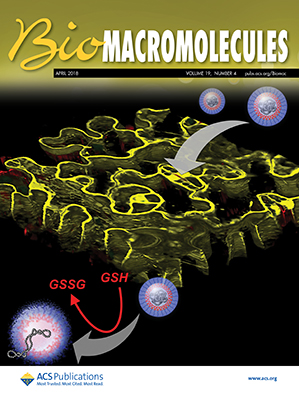Synthesis of Polymers via Cancer Cell Metabolism-Mediated Controlled Radical Polymerization and Application in Engineering of Cell Surface
IF 5.4
2区 化学
Q1 BIOCHEMISTRY & MOLECULAR BIOLOGY
引用次数: 0
Abstract
In this study, we present a novel chemical biology strategy that leverages the reductive metabolic pathways of cancer cells to develop a new approach for synthesizing polymers in nonstrictly anaerobic conditions. This method utilizes the reductive metabolism of cancer cells to reduce Cu(II) to Cu(I), enabling Cu(I)-catalyzed controlled radical polymerization with poly(ethylene glycol) methyl ether methacrylate (MAPEGOMe) monomer, producing polymers with low dispersity (1.28–1.38). Furthermore, we found that this method could use MAPEGOMe as a monomer to in situ form a polymer layer on the initiator-modified cell surface, achieving a cell surface engineering modification. This study reveals the broad application value and potential of cancer cell metabolism-mediated controlled radical polymerization in the fields of chemical biology and polymer science.
- Download: Download high-res image (112KB)
- Download: Download full-size image
肿瘤细胞代谢介导的可控自由基聚合合成聚合物及其在细胞表面工程中的应用。
在这项研究中,我们提出了一种新的化学生物学策略,利用癌细胞的还原代谢途径来开发一种在非严格厌氧条件下合成聚合物的新方法。该方法利用癌细胞的还原性代谢将Cu(II)还原为Cu(I),使Cu(I)催化与聚乙二醇甲基丙烯酸甲醚(MAPEGOMe)单体进行可控自由基聚合,产生低分散性(1.28-1.38)的聚合物。此外,我们发现该方法可以使用MAPEGOMe作为单体在引发剂修饰的细胞表面原位形成聚合物层,实现细胞表面工程修饰。这项研究揭示了癌细胞代谢介导的可控自由基聚合在化学生物学和高分子科学领域的广泛应用价值和潜力。
本文章由计算机程序翻译,如有差异,请以英文原文为准。
求助全文
约1分钟内获得全文
求助全文
来源期刊

Biomacromolecules
化学-高分子科学
CiteScore
10.60
自引率
4.80%
发文量
417
审稿时长
1.6 months
期刊介绍:
Biomacromolecules is a leading forum for the dissemination of cutting-edge research at the interface of polymer science and biology. Submissions to Biomacromolecules should contain strong elements of innovation in terms of macromolecular design, synthesis and characterization, or in the application of polymer materials to biology and medicine.
Topics covered by Biomacromolecules include, but are not exclusively limited to: sustainable polymers, polymers based on natural and renewable resources, degradable polymers, polymer conjugates, polymeric drugs, polymers in biocatalysis, biomacromolecular assembly, biomimetic polymers, polymer-biomineral hybrids, biomimetic-polymer processing, polymer recycling, bioactive polymer surfaces, original polymer design for biomedical applications such as immunotherapy, drug delivery, gene delivery, antimicrobial applications, diagnostic imaging and biosensing, polymers in tissue engineering and regenerative medicine, polymeric scaffolds and hydrogels for cell culture and delivery.
 求助内容:
求助内容: 应助结果提醒方式:
应助结果提醒方式:


